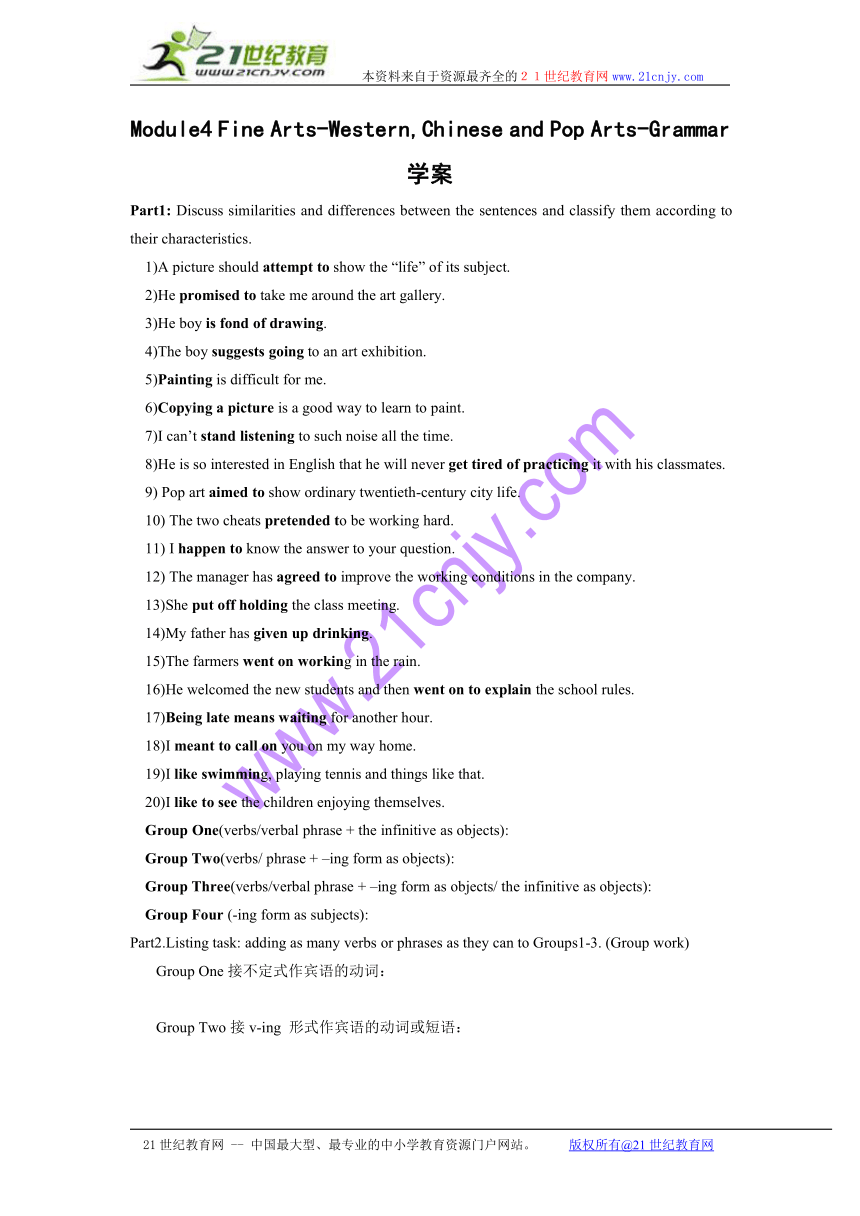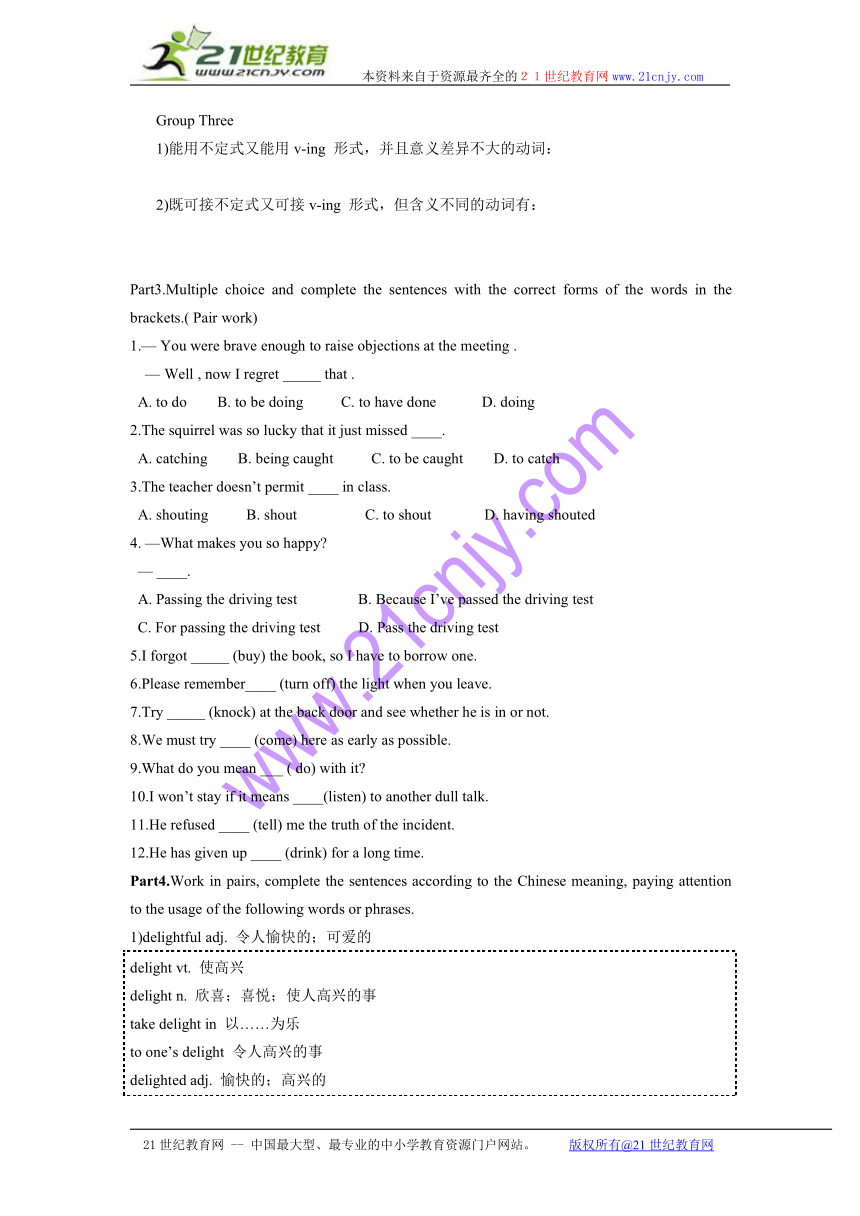英语:module4 fine arts-western ,chinese and pop arts-grammar学案(外研版必修2)
文档属性
| 名称 | 英语:module4 fine arts-western ,chinese and pop arts-grammar学案(外研版必修2) |

|
|
| 格式 | rar | ||
| 文件大小 | 17.0KB | ||
| 资源类型 | 教案 | ||
| 版本资源 | 外研版 | ||
| 科目 | 英语 | ||
| 更新时间 | 2009-09-22 00:00:00 | ||
图片预览


文档简介
本资料来自于资源最齐全的21世纪教育网www.21cnjy.com
Module4 Fine Arts-Western,Chinese and Pop Arts-Grammar 学案
Part1: Discuss similarities and differences between the sentences and classify them according to their characteristics.
1)A picture should attempt to show the “life” of its subject.
2)He promised to take me around the art gallery.
3)He boy is fond of drawing.
4)The boy suggests going to an art exhibition.
5)Painting is difficult for me.
6)Copying a picture is a good way to learn to paint.
7)I can’t stand listening to such noise all the time.
8)He is so interested in English that he will never get tired of practicing it with his classmates.
9) Pop art aimed to show ordinary twentieth-century city life.
10) The two cheats pretended to be working hard.
11) I happen to know the answer to your question.
12) The manager has agreed to improve the working conditions in the company.
13)She put off holding the class meeting.
14)My father has given up drinking.
15)The farmers went on working in the rain.
16)He welcomed the new students and then went on to explain the school rules.
17)Being late means waiting for another hour.
18)I meant to call on you on my way home.
19)I like swimming, playing tennis and things like that.
20)I like to see the children enjoying themselves.
Group One(verbs/verbal phrase + the infinitive as objects):
Group Two(verbs/ phrase + –ing form as objects):
Group Three(verbs/verbal phrase + –ing form as objects/ the infinitive as objects):
Group Four (-ing form as subjects):
Part2.Listing task: adding as many verbs or phrases as they can to Groups1-3. (Group work)
Group One接不定式作宾语的动词:
Group Two接v-ing 形式作宾语的动词或短语:
Group Three
1)能用不定式又能用v-ing 形式,并且意义差异不大的动词:
2)既可接不定式又可接v-ing 形式,但含义不同的动词有:
Part3.Multiple choice and complete the sentences with the correct forms of the words in the brackets.( Pair work)
1.— You were brave enough to raise objections at the meeting .
— Well , now I regret _____ that .
A. to do B. to be doing C. to have done D. doing
2.The squirrel was so lucky that it just missed ____.
A. catching B. being caught C. to be caught D. to catch
3.The teacher doesn’t permit ____ in class.
A. shouting B. shout C. to shout D. having shouted
4. —What makes you so happy
— ____.
A. Passing the driving test B. Because I’ve passed the driving test
C. For passing the driving test D. Pass the driving test
5.I forgot _____ (buy) the book, so I have to borrow one.
6.Please remember____ (turn off) the light when you leave.
7.Try _____ (knock) at the back door and see whether he is in or not.
8.We must try ____ (come) here as early as possible.
9.What do you mean ___ ( do) with it
10.I won’t stay if it means ____(listen) to another dull talk.
11.He refused ____ (tell) me the truth of the incident.
12.He has given up ____ (drink) for a long time.
Part4.Work in pairs, complete the sentences according to the Chinese meaning, paying attention to the usage of the following words or phrases.
1)delightful adj. 令人愉快的;可爱的
delight vt. 使高兴
delight n. 欣喜;喜悦;使人高兴的事
take delight in 以……为乐
to one’s delight 令人高兴的事
delighted adj. 愉快的;高兴的
be delighted to do sth./ that…/at/by/with
①He played a ____ melody on his flute.
他用笛子吹奏了欢快的曲调。
②He was a most delightful companion, full of wit and humor.
他是一个很惹人喜爱的同伴,十分机智幽默。
③____ ____ ____, our football team won.
令我们高兴的是,我们的足球队赢了。
④The clown ____ the audience.
小丑逗乐了观众。
⑤We were ____ ____ read your novel.
我们很高兴拜读你的小说。
2) scene n. 景色;风景;场;场面
scenery, scene, view, landscape和sight辨析
(1)scenery风景,景色。指某地的整个自然风景,事风景的总称。
(2)scene指具有一定特征的各种可见的景色,也常指事件或故事发生的地点,还有场景、场面之意。
(3)view指从某一角度或某一距离看到的景色,还有观点、看法之意。
(4)landscape通常指陆地上的风景,也可指风景画。
(5)sight表示“风景名胜、视力,视野”。
①The ____ of this play is set in Ireland.
这出戏的场景是在爱尔兰。
②There’s a fine ____ of the lake from our hotel window.
从我们旅馆的窗口可以看到湖的美丽风光。
③She preferred a good ____ to a portrait.
较之人像画她更喜欢美丽的风景画。
④He stood waving until the train was out of ____.
他站着挥手直到火车看不见了。
3) alive adj. 有活力的;有生气的;活着的;依然存在的
be alive with 充满了
come alive 活跃起来;变得有生气/繁忙
alive, live 和living辨析
1)alive强调某人极富有活力或某生物是有生命的,有别于死的或无生命的,常用作表语,补语或后置定语。
2)live通常作前置定语,且常修饰动物、鸟类、鱼类等,还有“实况播送的”的意思。Live 还可用作副词,表示“现场播出”之意。
living用于生物时,指“活着的;有生命的”,在句中可作定语或表语。
①The injured man is unconscious but still ____.
受伤的人不省人事但仍活着。
②The road is ____ ____ lookers on.
路上看热闹的人熙熙攘攘。
③They are campaigning against experiments on ____ ____.
他们正在开展反对用活动物做实验的运动。
4) observe vt. 观察;注意到;遵守;庆祝
observe sb. do sth./doing sth./done 看到某人做某事/正在做某事/被……
①He observed a stranger ____ with Mary.
他看到一个陌生人在和玛丽说话。
②I observed him ____ at the gate.
我看到他在门口停下来。
5adopt vt. 采用;收养
adopt an idea 采纳意见
adopt a child 领养孩子
①Our boss will ____ ____ ____.
我们的老板会采纳我们的建议。
②He refused ____ ____ the orphan.
他拒绝领养这个孤儿。
6)aim v. 以……为目标;打算;意欲
n. 目的;目标;瞄准
aim to do sth. 立志做某事;意欲做某事
aim (…) at … 把……瞄准……;旨在;针对
①I ____ ____ ____ a top student in our class.
我立志要在班里做一个优秀的学生。
②The government took new measures, ____ ____ deal with the financial crisis.
政府采取了新的措施来应对这场金融危机。
③The program ____ ____ ____ young teenagers.
这个节目是面向青少年的。
7)stand vt. (常用于否定句或疑问句)忍受,容忍
stand sb./sth. 忍受某人/某事
stand doing sth. 忍受做某事
①I just can’t stand the cold.
我受不了那么冷。
②She can’t stand ____ ____ ____ ____.
她受不了在这家工厂工作。
8) destroy vt. 破坏;毁坏
destroy表示“毁坏”, 通常指彻底的毁掉或毁灭, 往往暗示无法或很难修复,也可用于损坏抽象的东西,比如名誉、计划、努力等。
①The fire ____ ____ ____ ____.
大火毁了这个森林。
②He didn’t mean ____ ____ ____.
他并不是存心摧毁我们的希望。
9) take turns 轮流
take turns to do sth./take turns at doing sth. 轮流做某事
by turns 轮流地;时而……,时而……
①The doctors ____ ____ _____ joining in the mobile medical team now.
医生们轮流参加巡回医疗队。
②We agreed ____ ____ ____ ____ clean the classroom.
我们同意轮流打扫教室。
③He gets cheerful and sad ____ ____.
他的情绪高一阵低一阵。
Part5.Reciting the pithy formulas.
接不定式作宾语的动词【速记口诀】
同意提出学会的打算,要求答应来帮忙。
准备决定遭拒绝,敢于设法有希望。
未能做到莫假装,选择破釜沉舟当自强。
offer(提出), learn(学会), intend, plan(打算), demand, ask(要求), promise (答应), help (帮忙), prepare (准备), decide, determine (决定), refuse (拒绝), dare(敢于), manage(设法), wish, hope want, expect(希望,想要), fail, pretend (假装), choose(甘愿)
接动名词作宾语的动词【速记口诀】
建议停止享受--想象完成逃跑
(suggest, advise, stop, resist, enjoy, imagine, finish, escape)
承认借口--推迟实践
(admit, excuse, delay, practice)
认为应该保持头脑清醒--懂得避免冒险
(consider, keep, mind, understand, avoid, miss, risk)
21世纪教育网 -- 中国最大型、最专业的中小学教育资源门户网站。 版权所有@21世纪教育网
Module4 Fine Arts-Western,Chinese and Pop Arts-Grammar 学案
Part1: Discuss similarities and differences between the sentences and classify them according to their characteristics.
1)A picture should attempt to show the “life” of its subject.
2)He promised to take me around the art gallery.
3)He boy is fond of drawing.
4)The boy suggests going to an art exhibition.
5)Painting is difficult for me.
6)Copying a picture is a good way to learn to paint.
7)I can’t stand listening to such noise all the time.
8)He is so interested in English that he will never get tired of practicing it with his classmates.
9) Pop art aimed to show ordinary twentieth-century city life.
10) The two cheats pretended to be working hard.
11) I happen to know the answer to your question.
12) The manager has agreed to improve the working conditions in the company.
13)She put off holding the class meeting.
14)My father has given up drinking.
15)The farmers went on working in the rain.
16)He welcomed the new students and then went on to explain the school rules.
17)Being late means waiting for another hour.
18)I meant to call on you on my way home.
19)I like swimming, playing tennis and things like that.
20)I like to see the children enjoying themselves.
Group One(verbs/verbal phrase + the infinitive as objects):
Group Two(verbs/ phrase + –ing form as objects):
Group Three(verbs/verbal phrase + –ing form as objects/ the infinitive as objects):
Group Four (-ing form as subjects):
Part2.Listing task: adding as many verbs or phrases as they can to Groups1-3. (Group work)
Group One接不定式作宾语的动词:
Group Two接v-ing 形式作宾语的动词或短语:
Group Three
1)能用不定式又能用v-ing 形式,并且意义差异不大的动词:
2)既可接不定式又可接v-ing 形式,但含义不同的动词有:
Part3.Multiple choice and complete the sentences with the correct forms of the words in the brackets.( Pair work)
1.— You were brave enough to raise objections at the meeting .
— Well , now I regret _____ that .
A. to do B. to be doing C. to have done D. doing
2.The squirrel was so lucky that it just missed ____.
A. catching B. being caught C. to be caught D. to catch
3.The teacher doesn’t permit ____ in class.
A. shouting B. shout C. to shout D. having shouted
4. —What makes you so happy
— ____.
A. Passing the driving test B. Because I’ve passed the driving test
C. For passing the driving test D. Pass the driving test
5.I forgot _____ (buy) the book, so I have to borrow one.
6.Please remember____ (turn off) the light when you leave.
7.Try _____ (knock) at the back door and see whether he is in or not.
8.We must try ____ (come) here as early as possible.
9.What do you mean ___ ( do) with it
10.I won’t stay if it means ____(listen) to another dull talk.
11.He refused ____ (tell) me the truth of the incident.
12.He has given up ____ (drink) for a long time.
Part4.Work in pairs, complete the sentences according to the Chinese meaning, paying attention to the usage of the following words or phrases.
1)delightful adj. 令人愉快的;可爱的
delight vt. 使高兴
delight n. 欣喜;喜悦;使人高兴的事
take delight in 以……为乐
to one’s delight 令人高兴的事
delighted adj. 愉快的;高兴的
be delighted to do sth./ that…/at/by/with
①He played a ____ melody on his flute.
他用笛子吹奏了欢快的曲调。
②He was a most delightful companion, full of wit and humor.
他是一个很惹人喜爱的同伴,十分机智幽默。
③____ ____ ____, our football team won.
令我们高兴的是,我们的足球队赢了。
④The clown ____ the audience.
小丑逗乐了观众。
⑤We were ____ ____ read your novel.
我们很高兴拜读你的小说。
2) scene n. 景色;风景;场;场面
scenery, scene, view, landscape和sight辨析
(1)scenery风景,景色。指某地的整个自然风景,事风景的总称。
(2)scene指具有一定特征的各种可见的景色,也常指事件或故事发生的地点,还有场景、场面之意。
(3)view指从某一角度或某一距离看到的景色,还有观点、看法之意。
(4)landscape通常指陆地上的风景,也可指风景画。
(5)sight表示“风景名胜、视力,视野”。
①The ____ of this play is set in Ireland.
这出戏的场景是在爱尔兰。
②There’s a fine ____ of the lake from our hotel window.
从我们旅馆的窗口可以看到湖的美丽风光。
③She preferred a good ____ to a portrait.
较之人像画她更喜欢美丽的风景画。
④He stood waving until the train was out of ____.
他站着挥手直到火车看不见了。
3) alive adj. 有活力的;有生气的;活着的;依然存在的
be alive with 充满了
come alive 活跃起来;变得有生气/繁忙
alive, live 和living辨析
1)alive强调某人极富有活力或某生物是有生命的,有别于死的或无生命的,常用作表语,补语或后置定语。
2)live通常作前置定语,且常修饰动物、鸟类、鱼类等,还有“实况播送的”的意思。Live 还可用作副词,表示“现场播出”之意。
living用于生物时,指“活着的;有生命的”,在句中可作定语或表语。
①The injured man is unconscious but still ____.
受伤的人不省人事但仍活着。
②The road is ____ ____ lookers on.
路上看热闹的人熙熙攘攘。
③They are campaigning against experiments on ____ ____.
他们正在开展反对用活动物做实验的运动。
4) observe vt. 观察;注意到;遵守;庆祝
observe sb. do sth./doing sth./done 看到某人做某事/正在做某事/被……
①He observed a stranger ____ with Mary.
他看到一个陌生人在和玛丽说话。
②I observed him ____ at the gate.
我看到他在门口停下来。
5adopt vt. 采用;收养
adopt an idea 采纳意见
adopt a child 领养孩子
①Our boss will ____ ____ ____.
我们的老板会采纳我们的建议。
②He refused ____ ____ the orphan.
他拒绝领养这个孤儿。
6)aim v. 以……为目标;打算;意欲
n. 目的;目标;瞄准
aim to do sth. 立志做某事;意欲做某事
aim (…) at … 把……瞄准……;旨在;针对
①I ____ ____ ____ a top student in our class.
我立志要在班里做一个优秀的学生。
②The government took new measures, ____ ____ deal with the financial crisis.
政府采取了新的措施来应对这场金融危机。
③The program ____ ____ ____ young teenagers.
这个节目是面向青少年的。
7)stand vt. (常用于否定句或疑问句)忍受,容忍
stand sb./sth. 忍受某人/某事
stand doing sth. 忍受做某事
①I just can’t stand the cold.
我受不了那么冷。
②She can’t stand ____ ____ ____ ____.
她受不了在这家工厂工作。
8) destroy vt. 破坏;毁坏
destroy表示“毁坏”, 通常指彻底的毁掉或毁灭, 往往暗示无法或很难修复,也可用于损坏抽象的东西,比如名誉、计划、努力等。
①The fire ____ ____ ____ ____.
大火毁了这个森林。
②He didn’t mean ____ ____ ____.
他并不是存心摧毁我们的希望。
9) take turns 轮流
take turns to do sth./take turns at doing sth. 轮流做某事
by turns 轮流地;时而……,时而……
①The doctors ____ ____ _____ joining in the mobile medical team now.
医生们轮流参加巡回医疗队。
②We agreed ____ ____ ____ ____ clean the classroom.
我们同意轮流打扫教室。
③He gets cheerful and sad ____ ____.
他的情绪高一阵低一阵。
Part5.Reciting the pithy formulas.
接不定式作宾语的动词【速记口诀】
同意提出学会的打算,要求答应来帮忙。
准备决定遭拒绝,敢于设法有希望。
未能做到莫假装,选择破釜沉舟当自强。
offer(提出), learn(学会), intend, plan(打算), demand, ask(要求), promise (答应), help (帮忙), prepare (准备), decide, determine (决定), refuse (拒绝), dare(敢于), manage(设法), wish, hope want, expect(希望,想要), fail, pretend (假装), choose(甘愿)
接动名词作宾语的动词【速记口诀】
建议停止享受--想象完成逃跑
(suggest, advise, stop, resist, enjoy, imagine, finish, escape)
承认借口--推迟实践
(admit, excuse, delay, practice)
认为应该保持头脑清醒--懂得避免冒险
(consider, keep, mind, understand, avoid, miss, risk)
21世纪教育网 -- 中国最大型、最专业的中小学教育资源门户网站。 版权所有@21世纪教育网
